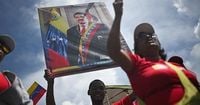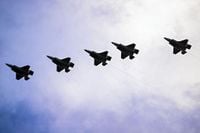U.S. military officials are actively drawing up plans for possible drone strikes inside Venezuela, targeting alleged drug traffickers and their operations—a move that could mark a dramatic escalation in the Trump administration’s ongoing campaign against narcotics flowing into the United States. According to NBC News and corroborated by several sources, including two U.S. officials and others familiar with the discussions, these plans could be operational within weeks, though as of September 27, 2025, President Donald Trump has not yet given his final approval.
The proposals center on precision drone attacks aimed at the leadership of drug trafficking groups and the clandestine labs believed to be refining narcotics. The urgency, officials say, is driven by mounting frustration in Washington that Venezuelan President Nicolás Maduro has not taken sufficient steps to stem the tide of illegal drugs—mainly cocaine—moving through his country and onward to the U.S.
“We’ll see what happens. Venezuela is sending us their gang members, their drug dealers and drugs. It’s not acceptable,” Trump declared earlier this month, as cited by NBC News. The sentiment reflects a growing consensus among senior administration officials that more forceful action may be necessary after existing military pressure failed to shake Maduro’s grip on power or prompt significant action against the drug lords.
Recent weeks have already seen a notable uptick in American military activity in the Caribbean. U.S. forces have struck at least three Venezuelan boats suspected of ferrying narcotics, including a September 2 operation that targeted a vessel run by the notorious Tren de Aragua gang. While the administration has not produced evidence that all targeted vessels carried drugs, a Dominican Republic official and a U.S. Embassy representative confirmed that narcotics were recovered from the water after one such strike.
The legality of these actions—especially as they occurred in international waters—has come under scrutiny, with critics questioning the lack of transparent evidence and the potential for unintended consequences. The Pentagon, for its part, has declined to comment on the specifics of these recent operations or the plans for expanded strikes.
Meanwhile, the U.S. military presence in the region has grown considerably. At least eight ships, carrying more than 4,000 personnel and supported by F-35 fighter jets based in Puerto Rico, have been deployed to Caribbean waters. “You don’t move that many resources down there without looking at all options,” one source told NBC News. Another official added, “You can’t keep that kind of firepower in the Caribbean forever.” The deployment, they noted, could soon begin to impact U.S. military commitments elsewhere if prolonged.
Despite the saber-rattling, diplomatic channels remain open—albeit through unconventional means. The United States and Venezuela have been communicating via intermediaries from allied Middle Eastern countries, discussing possible concessions Maduro might make to preserve his hold on power. Details of these back-channel talks remain closely guarded, but their existence underscores the complexity of Washington’s approach, which oscillates between pressure and negotiation.
Maduro himself has publicly denied any involvement in drug trafficking, instead accusing the U.S. of seeking to oust him by any means necessary. In early September, he sent a letter to President Trump—reviewed by Reuters and confirmed by the White House—offering to open direct talks. “These and other issues will always be open for a direct and frank conversation with your special envoy to overcome media noise and fake news,” Maduro wrote, referencing special envoy Richard Grenell. He further asked Trump to join him in “defeating the falsehoods that have tarnished our relationship, which must be historic and peaceful.”
But the Trump administration has shown little interest in Maduro’s overtures. White House press secretary Karoline Leavitt was blunt: “Frankly, I think there were a lot of lies that were repeated by Maduro in that letter, and the administration’s position on Venezuela has not changed. We view the Maduro regime as illegitimate, and the president has clearly shown that he’s willing to use any and all means necessary to stop the illegal trafficking of deadly drugs from the Venezuelan regime into the United States of America.”
Some in the administration, such as Secretary of State Marco Rubio, have advocated for regime change as a solution to both the narcotics crisis and the ongoing political standoff. Others, including special envoy Ric Grenell, continue to push for diplomatic engagement, reflecting a divide within the U.S. government over the best path forward.
The roots of this standoff stretch back years. In 2020, the U.S. Justice Department indicted Maduro on drug trafficking charges, accusing him of working with criminal cartels to send cocaine and gang members to the United States. The reward for his arrest now stands at a staggering $50 million. While Venezuela is not a major producer of cocaine, it is widely recognized as a critical transit point for narcotics shipments leaving South America. The country, however, is not considered a source of illegal fentanyl, most of which enters the U.S. from Mexico.
Analysts warn that any direct U.S. attack on Venezuelan soil could have far-reaching repercussions. “An attack on Venezuelan soil would have consequences from diplomatic protests to an increase in political persecutions of those they classify as collaborators, to further uniting the population with the need to defend sovereignty reaffirmed,” Venezuelan political analyst Anibal Sanchez Ismayel told NBC News.
Despite the high tensions, some cooperation between the two countries has continued, particularly on matters such as deportation flights. As of September 19, officials confirmed that 54 such flights had been conducted this year, indicating that, even amid threats and accusations, certain lines of communication remain open.
The coming weeks will likely prove decisive. With military options on the table and diplomatic efforts ongoing, the Trump administration faces a critical choice: escalate its campaign against Maduro and risk a broader conflict, or double down on negotiation in hopes of achieving its objectives without resorting to force. Either way, the stakes—for both nations and the wider region—could hardly be higher.



